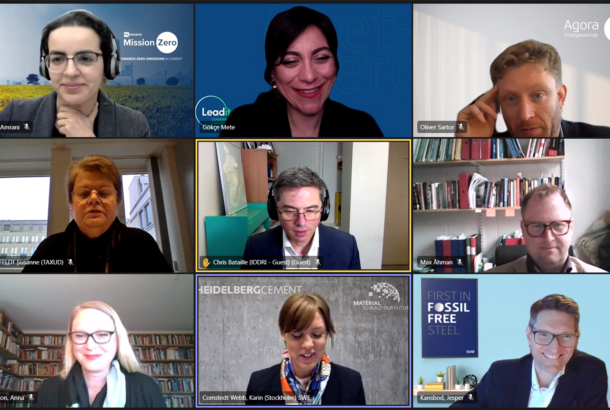LeadIT Dialogue: Preventing the Risks of Carbon Leakage.
Key messages
- Measures to prevent carbon leakage are not a silver bullet, but are instead complementary to market incentivizing policy mixes, industry action, and partnerships across value chains.
- The extent to which the EU’s Carbon Border Adjustment Mechanism (CBAM) can spur innovation for industry transition is not yet clear, but progress on transition can be made by targeting research and innovation and subsidizing breakthrough technologies.
- While some international implications of the CBAM are known, such as climate mitigation, equity and trade, many details of crucial importance for international companies and countries are yet to be drafted, including the implementation of CBAM exemptions.
Download
Read the briefLeadIT hosted an online cross-sectoral policy dialogue co-organized by FLSmidth, HeidelbergCement and SSAB, bringing together public and private sector representatives. Read the full brief for their take on CBAM, international implications to the industry and global decarbonisation efforts and complementary measures deemed necessary to prevent carbon leakage.

LeadIT Dialogue: Preventing Risks of Carbon Leakage participants
Carbon leakage refers to the notion that businesses may move their production to countries where emissions constraints are less restrictive and the cost of compliance with climate policies is lower, to avoid competitive disadvantage this could lead to. This is particularly important for heavy industries where companies operate in competitive international markets with thin profit margins. Addressing carbon leakage therefore has international implications for governments and businesses.
The most notable carbon leakage prevention measure, the Carbon Border Adjustment Mechanism (CBAM) was proposed by the European Commission as part of the Fit for 55 policy package, which aims to reduce the EU’s greenhouse gas emissions by 55% by 2030. CBAM’s climate contribution is twofold. First, it is designed to reduce the risk of carbon leakage. Second, it could help accelerate climate ambition in countries with more lenient climate policies. Details of the Mechanism are currently under consideration within the EU. The pilot phase of the measure is supposed to begin in 2023 and be fully enforced in 2026. The current proposal covers iron and steel, cement, aluminum, fertilizers, and electricity, with extended coverage of 56 categories of goods along associated value chains.
